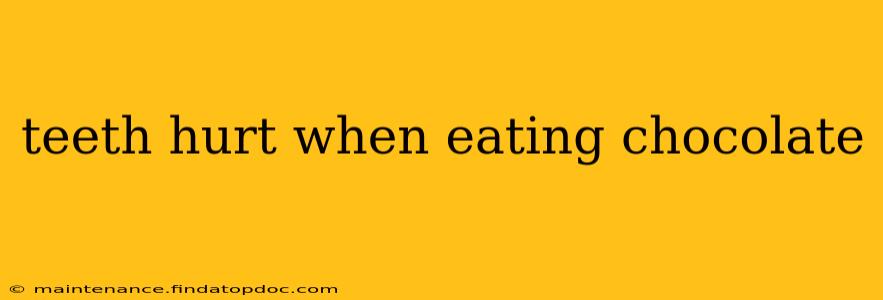Many people enjoy the rich, decadent pleasure of chocolate, but for some, this indulgence comes with a painful side effect: tooth sensitivity. If your teeth hurt when eating chocolate, you're not alone. This common problem can stem from several underlying issues, and understanding the cause is the first step towards finding relief. This comprehensive guide will explore the reasons behind this sensitivity and offer solutions to help you enjoy your chocolate guilt-free.
Why Do My Teeth Hurt When I Eat Chocolate?
The sensitivity you experience when eating chocolate can be attributed to a few key factors:
1. Temperature Sensitivity:
Chocolate, especially when cold, can trigger pain in teeth with exposed dentin. Dentin is the layer beneath the enamel, and it contains microscopic tubules that lead directly to the nerve. When cold chocolate comes into contact with these tubules, it sends a sharp, shooting pain. This is often associated with cavities, gum recession, or worn enamel.
2. Acidity:
Chocolate, depending on its type and ingredients, can be surprisingly acidic. This acidity can erode the enamel over time, leaving the dentin exposed and vulnerable to temperature changes and other stimuli. Dark chocolate, in particular, tends to be more acidic than milk chocolate.
3. Sugar Content:
The high sugar content in many chocolates contributes to the formation of plaque and acid attacks on tooth enamel. Bacteria feed on sugar, producing acids that erode enamel, making teeth more sensitive. This process can lead to cavities and further increase sensitivity.
4. Existing Dental Issues:
Pre-existing dental problems significantly increase the likelihood of experiencing pain when eating chocolate. These include:
- Cavities: Decayed areas expose the dentin, making teeth highly sensitive.
- Cracked Teeth: Microscopic cracks can allow stimuli to reach the nerve, causing pain.
- Gum Recession: When gums recede, they expose the root surface of the teeth, which is far more sensitive than enamel.
- Teeth Grinding (Bruxism): This can wear down enamel, increasing sensitivity.
How Can I Stop My Teeth from Hurting When I Eat Chocolate?
Addressing the underlying cause is key to managing the pain. Here are some helpful strategies:
What to do if your teeth hurt after eating chocolate?
If the pain is mild and temporary, rinsing your mouth with warm water can help. Avoid very hot or cold drinks immediately afterward. Over-the-counter pain relievers like ibuprofen can temporarily alleviate the discomfort. However, if the pain is severe, persistent, or accompanied by other symptoms, it's crucial to consult a dentist immediately.
Can I still eat chocolate if my teeth hurt?
Yes, you can still enjoy chocolate, but moderation and mindful consumption are vital. Choose less acidic varieties like milk chocolate and eat it in smaller portions. Rinsing your mouth with water afterward can help neutralize the acids.
What kind of chocolate is least likely to hurt sensitive teeth?
Milk chocolate generally has a lower acidity level than dark chocolate. However, the sugar content remains a factor. Look for chocolates with lower sugar content and consider opting for sugar-free alternatives.
How can I prevent my teeth from hurting when I eat chocolate in the future?
- Maintain excellent oral hygiene: Brush and floss diligently twice a day.
- Use a desensitizing toothpaste: These toothpastes contain ingredients that help block the tubules in dentin, reducing sensitivity.
- Visit your dentist regularly: Regular checkups and cleanings can help identify and address potential dental issues early on.
- Consider using a mouthguard: If you grind your teeth at night, a mouthguard can protect your enamel.
By understanding the causes of tooth sensitivity when eating chocolate and following these preventive measures, you can continue to enjoy this delicious treat without the pain. Remember that if your tooth sensitivity is persistent or severe, consulting a dentist is crucial for proper diagnosis and treatment.
